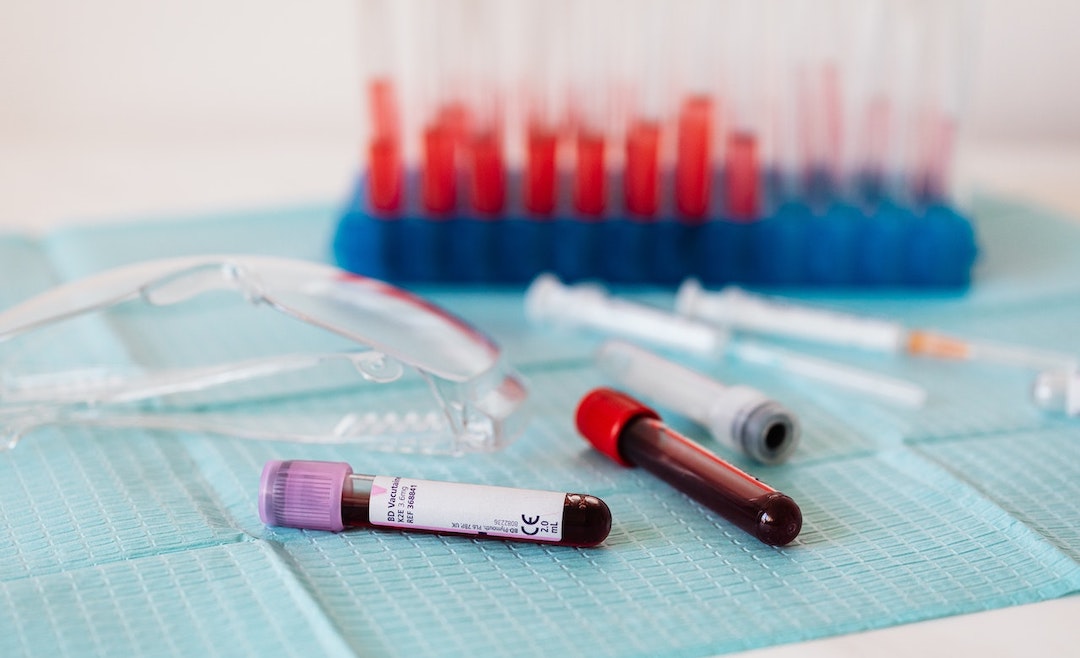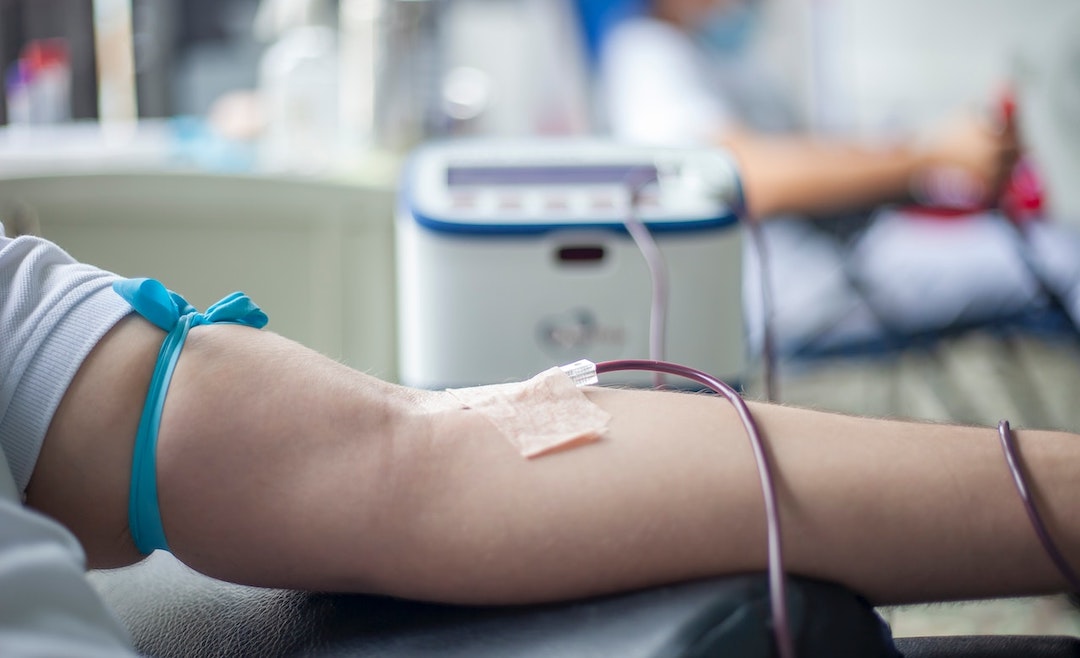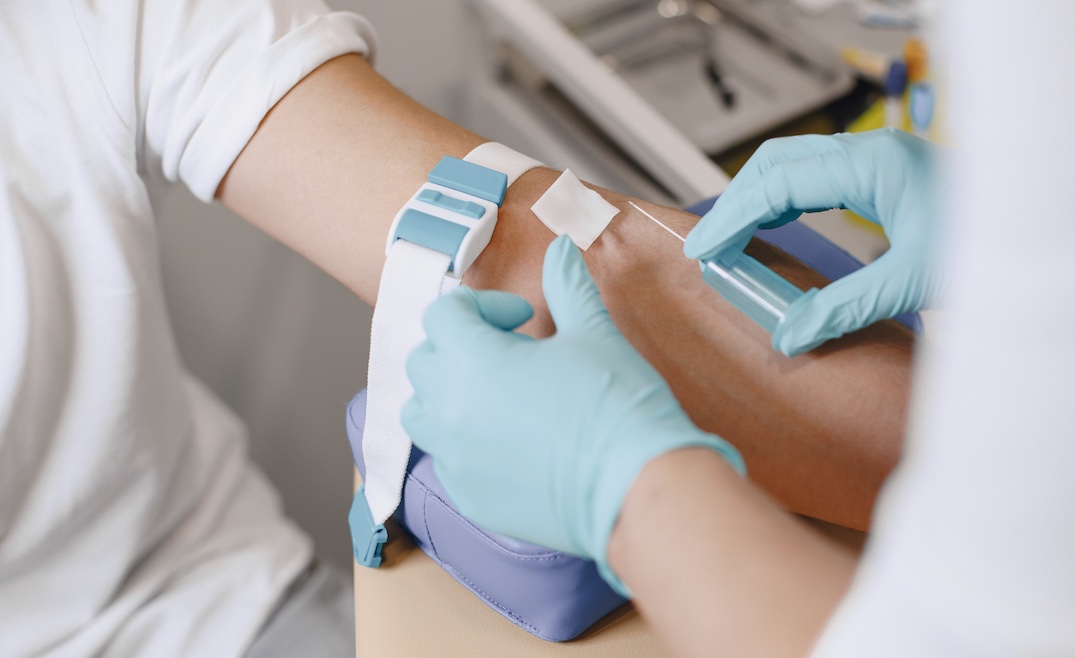A phlebotomist is an essential member of the healthcare team. Phlebotomists are responsible for drawing blood samples from patients and getting those samples to the laboratory.
The blood tests they draw can help guide treatment for patients, diagnose different illnesses, and measure medication levels in the body.
But how do you become a phlebotomist?
You can become a phlebotomist by obtaining your high school diploma or GED and attending a phlebotomy training course.
This guide breaks down the steps required to become a phlebotomist, including certification options, resume building, and more.
How to Become a Phlebotomist
If you want to start a career in healthcare, you might consider becoming a phlebotomist. Most people are able to get their certification and find a job in just a few weeks.
Here are the steps required to become a phlebotomist:
1. Obtain Your High School Diploma or GED
Before you can attend a phlebotomy training program or start working as a phlebotomist, you will need to earn your high school diploma or GED.
If you have not yet earned your GED, you can sign up and complete your test online as soon as you feel ready.
2. Research Phlebotomy Training Programs
If you want to become a phlebotomist, there are hundreds of training programs for you to choose from. You can choose from online courses, part-time classes, or full-time accelerated programs.
For each phlebotomy training program that interests you, check out online reviews, find out whether they are accredited, and ask how they prepare you for your certification exam. You may want to find a program that offers help with job placement or career counseling.
If a course is offered completely online, find out how it will help you become proficient in drawing blood and handling needles. Online courses should include an externship to help you practice your skills.
Certifying agencies often require multiple hours of in-person practice before you will be eligible to take your certification exam.
3. Enroll in a Phlebotomy Training Program
You may need a few things before you can enroll in a phlebotomy training program. Since you will be working with patients, you may need your CPR certification before you get started. Some programs also require a background and criminal record check.
Most phlebotomy training programs will also require you to be vaccinated against common blood-borne diseases since phlebotomists are at risk of needlestick injuries.
4. Take Your Certification Exam
There are many different types of phlebotomy certifications that you can choose from. There is no national standard for certification exams, and the requirements for all of them are slightly different.
Most employers are not picky about the exact certification you get. However, if you have a job already lined up or a specific facility you would like to work for, it is worth asking if they have a preference.
One of the most widely accepted is the National Heatlhcareer's Certified Phlebotomy Technician (CPT) certification.
5. Build Your Resume
You don’t have to have perfect grades or years of healthcare experience to build a good resume. Include any extracurricular activities you have participated in, awards you have received, or leadership opportunities you have taken.
Have someone else read your resume before you submit it. They may be able to point out typing errors or help you improve the organization and formatting of your resume.
If you do not have a long work history, try to get a letter of recommendation from a teacher, coach, or supervisor. Having a third party talk about your strengths can have a big impact on your chances of getting hired.
A strong cover letter talking about why you would be a valuable member of the healthcare team can also overcome a lack of experience.
6. Apply for Jobs
Websites like Monster and Indeed are great for finding and applying for phlebotomy jobs. Some job search sites even offer resume-building tools to increase your chances of getting hired.
Some large healthcare organizations only post jobs directly on their website. If there is a specific organization or facility you hope to work in, don’t forget to check their website or call them directly to find out if they have any openings.
If you are selected for an interview, practice answering a few questions with a family member or friend before your official interview. This can help calm your nerves and help you feel more prepared.
7. Maintain Your Phlebotomy Certification
After you pass your exam and get a job as a phlebotomist, you still have to maintain your certification. Each certification has slightly different requirements. You may need to renew your certification once a year, every two years, or every four years.
Most recertifications require several hours of continuing education or proof of hours spent working along with a recertification fee. Recertification fees usually cost around $100.
Choosing the Right Phlebotomy Training Program
With so many options to choose from, it can be overwhelming to try to choose the best training program. You might be tempted to choose the shortest or least expensive phlebotomy training program, or just select the first one that appears in an internet search.
There are a few important things to consider before jumping into a phlebotomy program.
- Accreditation. If a program is accredited, that means it has met certain requirements and has been approved by an accrediting agency. Accredited programs are more likely to prepare you for both your certification exam and your career as a phlebotomist.
- Certification. Find out what the program does to prepare their students for their certification exam, and if they recommend a specific certification.
- Cost. Cost is an important consideration for any training program. Phlebotomy training courses generally cost between $500 to $1,500, depending on their length and location. Online courses are generally less expensive than in-person programs. You can see the cheapest phlebotomy classes and training programs here.
- Length. Some phlebotomy programs promise to have you certified in as little as four weeks. While it is possible, it will take a lot of commitment to study on your own. Most programs last around 12 weeks long, which gives you enough time to study and practice your skills before you take your exam.
- Online vs in-person. Online courses are convenient, but they take a lot of self-discipline. In-person classes are less flexible but allow you to ask questions and interact directly with your instructor. Decide which type of learning is best for you before you commit to a program one way or another.
Different Phlebotomist Certification Options
There are many different organizations that offer phlebotomy certification. No certification is Nationally recognized, and most employers are not picky about which exam you take, as long as you are certified.
Certified Phlebotomy Technician (CPT) – NHA
The National Healthcareer Association (NHA) is one of the most well-known certifying agencies in the United States.
- Requirements: Completion of an accredited phlebotomy program with evidence of at least 30 venipunctures and 10 capillary sticks OR 1 year of supervised work experience as a phlebotomy technician
- Cost: $117
- Exam Questions: 100 scored, 20 unscored
- Renewal Requirements: $179 fee and 10 continuing education credits every two years.
Phlebotomy Technician (PBT) – ASCP
The American Society for Clinical Pathology (ASCP) offers a Phlebotomy Technician Certification (PBT) exam.
- Requirements: Completion of an accredited phlebotomy program with at least 100 venipunctures, up-to-date immunizations, and CPR certification
- Cost: $135
- Exam Questions: 80
Phlebotomy Technician Certificate (PTC) – ASPT
The American Society of Pharmacy Technicians (ASPT) offers a certification
- Requirements: Complete an accredited pharmacy technician training program with proof of 75 venipunctures and 5 fingersticks OR 6 months of full-time work as a phlebotomy technician OR 1 year or part-time work as a phlebotomy technician
- Cost: $175
- Exam Questions: 120
- Renewal Requirements: 6 continuing education credits and $35 by December 31 each year.
Phlebotomy Technician (RPT) – AMT
The Phlebotomy Technician Certification offered by the American Medical Technologists is another well-known certification that is accepted by most employers.
- Requirements: Complete an accredited training program that includes at least 150 didactic hours with proof of 50 venipunctures and 10 fingersticks
- Cost: $125
- Exam Questions: 200
Certified Phlebotomist Technologist (CPT) – NPA
A Certified Phlebotomist Technologist certification can be earned through the National Phlebotomy Association (NPA). This certification includes a membership to the NPA.
- Requirements: Complete an accredited program with at least 160 lecture hours and 200 practical hours
- Cost: $90
- Exam Questions: 120
- Renewal Requirements: $100 yearly fee
Phlebotomy Technician Certification (PTC) – AMCA
American Medical Certification Association (AMCA) offers the Phlebotomy Technician Certification.
- Requirements: Complete a training course with at least 30 venipunctures OR 1 year of full-time work as a pharmacy technician + Agree to and sign the AMCA code of ethics
- Cost: $109
- Exam Questions: 100
- Renewal Requirements: $35 fee and 10 continuing education credits every two years
Paying for Phlebotomist Schooling or Training
Phlebotomist training is much less expensive than earning a degree or diploma, but you may still need help covering the cost of your phlebotomy training program. While it is more difficult to get outside funding for certifications, it is possible.
- Scholarships. Private scholarships for certification programs are rare, but they are out there. The Garza & Bean-McBride Phlebotomy Student Scholarships are one option for phlebotomy students who need help paying for their education.
- Grants. There are some grants available for certificate programs like the Cal Grant Program.
- Student loans. You may be able to get a student loan through FAFSA if you are attending a certificate program through a college. Private lenders and banks may be willing to give you a private loan, but the interest rates are usually high.
- Employer sponsorship. Having an employer pay for your certification is the most common way that people get the cost of their certification covered. Many employers offer tuition reimbursement programs where you commit to working for the company for a specified period of time in exchange for the employer covering the cost of your education.
Is it Possible to Get a Phlebotomy Job With No Experience or Certification?
You may be able to get a phlebotomy job with no experience or certification, but it depends on the state you live in.
California, Colorado, Louisiana, and Nevada require all phlebotomists to pass a certification exam. While certification is not required in other states, most employers prefer to hire phlebotomists who have earned their certification.
Getting your certification will make it easier to find a job as a phlebotomist no matter where you live, and may help you earn more money.
Phlebotomist Salary & Job Outlook
The median salary for a phlebotomist in the United States is $41,810 per year or around $20.10 per hour. Phlebotomists working in doctors’ offices tend to earn the lowest salaries, while those in emergency services make the most.
Employment of phlebotomists is expected to increase by 8% between 2022 and 2032, faster than the average for other occupations.
Benefits of Becoming a Phlebotomist
Phlebotomy is a great career choice for anyone who wants to get started in healthcare.
- Decent salary. Phlebotomists earn a decent salary when you consider how little training is required compared to other healthcare jobs. You can become a phlebotomist and start earning money in just a few weeks.
- Ability to help others. Phlebotomists help the healthcare team get important information about how to best take care of the patient. Blood taken by a phlebotomist can help identify infections, cancer, electrolyte imbalances, and blood sugar problems. Getting accurate lab results from blood tests can save lives.
- Good experience. Phlebotomy offers an excellent experience for people who want to pursue more advanced healthcare careers. Nursing school, respiratory therapy school, and medical school all require applicants to have some direct patient care experience.
- High demand. The demand for good phlebotomists is high and will continue to grow over the coming years. Certified phlebotomists shouldn’t have any trouble finding a job.
- Workplace variety. Phlebotomists can work in many different settings. They may work in a lab, a doctor's office, an emergency room, or an intensive care unit.
Skills Required to Become a Phlebotomist
Being a phlebotomist isn’t for just anyone. There are several skills that you’ll need to have a successful career in phlebotomy:
- Organized
- Good bedside manner
- Detail-oriented
- Steady hands
- Comfortable with body fluids
- Patient
- Kind and empathetic




.svg)









